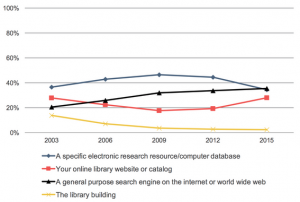The Research Services Forum met last week to discuss the recent Ithaka Faculty Survey. Ithaka S+R has conducted a survey of faculty every three years since 2000, providing libraries with a “snapshot of practices and perceptions related to scholarly communications and information usage.” This year, the survey population consisted of faculty members from all disciplines in the arts, sciences and most professions at U.S. colleges and universities (offering bachelor’s degree or higher). This translates to a survey distribution of 145,500 faculty members yielding a response of 9,203 (6.3%). The Ithaka surveys rightfully receive a good deal of attention in the higher education and library press, as providing useful data on trends in faculty perceptions and needs – essential for librarians to know about and consider for their own work.
Ithaka Faculty Survey: A Key Finding
Discovery starting points remain in flux. After faculty members expressed strongly preferring starting their research with a specific electronic research resource/database as compared to other starting points in previous cycles of this survey, they are now reporting being equally as likely to begin with a general purpose search engine as they are with a specific electronic research resource/database. Furthermore, the online library website/catalog has become increasingly important for conducting research since the previous cycle of the survey.
This finding was based on the following question and response, “Below are four position starting points for research in academic literature. Typically, when you are conducting academic research, which of these four starting points do you use to begin locating information for your research?”
 This finding is notable as an indicator of changing research behaviors, as well as for its potential implications for library work. But it’s a bit more complicated.
This finding is notable as an indicator of changing research behaviors, as well as for its potential implications for library work. But it’s a bit more complicated.
Local Research with Religious Studies Faculty
The timing of Ithaka’s publication was fortuitous, as here at Temple Libraries we are also talking with faculty about research practice and beginning to synthesize our local findings. Ours is also an Ithaka-sponsored project with a different methodology – a series of structured open-ended interviews with 12 faculty in the Religious Studies department. The local research team is made up of Fred Rowland, Rebecca Lloyd, Justin Hill and myself. Fred did a great job of contacting faculty and helping to arrange the interviews – the research team shared conducting interviews and reviewing the transcribed recordings. Update: Final Report is now posted here: templeuniversity_religiousstudies_finalreport.
The project is part of a broader investigation into discipline-specific practice (the final report will include 40 libraries), but covers similar ground to understand how faculty:
- Position their work in the academy
- Locate their sources
- Select where to publish, including use of open access
- Manage and store data
- Use social media
- Keep up with trends in the field
A question posed to Temple faculty was related to the survey’s “starting point” question but worded somewhat differently. We asked, “How do you locate the primary and/or secondary source materials you use in your research?” There was tremendous variation in how this question was answered, and how it was understood. For instance, faculty members do not have a fixed, single “starting” point. This depends on many factors: the specific project, the seniority of the researcher, and the scholar’s relationship to the librarian. Faculty members are often unclear as to where they are, and what tools they are using, when looking for information. They describe “The portal” 0r the “humanities search engine”. Is this Summon? JSTOR, The library’s website?
But the greatest challenge, for our religious studies scholars, is tracking down archival and primary source material that may reside in schools, theological libraries and historical societies. Senior scholars tend to use their own social/professional networks when exploring a new topic. Others may reach out to their liaison librarian for guidance in the specific databases and search strategies appropriate to their topic.
Methods
The value of a qualitative interview for these kinds of questions is the possibility of probing deeper with the participant. What seems like a simple question, “How do you begin your research?”, yielded complex and at times, confounding responses. Can a survey adequately get at this? Are there ways in which the library should be acting upon these findings? Fortunately, the Research Forum provides an opportunity to share and discuss this kind of research and its implications for library services and practice.
Thanks to the organizing group (Brian Boling, Kristina DeVoe, Andrea Goldstein, Josue Hurtado and Margaret Janz) for inviting us to talk about the Ithaka research projects. More to come.
